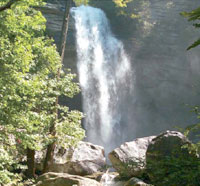
 |
 |
Pictured is Laurel Falls at a Pocket Wilderness site in Tennessee. Clean water remains one of our most treasured resources. Water protection is standard procedure for Bowater's forestry and manufacturing operations. Many special sites on Bowater forests and waterways in both the United States and Canada are uniquely protected for their ecological significance and for the important role they serve in keeping our natural environment healthy. |
We recycle over 1.5 million short tons of old newspapers and old magazines each year for reuse into our paper products. The average content of recycle fiber in our newsprint is 38% of our total production compared to the industry average of 30%. Our recycling program doesn't stop just with old papers. Our mills in Calhoun, Tennessee, and Catawba, South Carolina, use over 6,000 old tires daily for energy, reducing the use of fossil fuel. Bark waste (biomass) has long been utilized by our mills for energy and steam production. Ash from our power boilers is used by farmers to raise the pH levels of their croplands. At our South Korea facility, ash from the biomass boiler is used as a raw material for the making of cement.
Our Catawba mill is one of only four U.S. kraft facilities to meet the EPA’s Voluntary Advanced Technology Incentives Program Tier 1 requirements. Tier 1 facilities reduce adsorbable organic halide (AOX) emissions to less than half the minimum requirements of standard facilities. The Thunder Bay mill recently completed several projects to capture odorous compounds and reduce particulate emissions. And at our Gatineau, Quebec, mill, the Canadian Minister of Natural Resources presented us with an award for reducing greenhouse gas emissions by 83% over a 14-year period.
All of Bowater's kraft pulp is elemental chlorine free or ECF. Large amounts of water are used in the papermaking process. We are constantly taking steps to reduce consumption of this resource. In just two years we have reduced water usage at Thunder Bay by 18%. At Catawba, where production has increased, we are using 33% less water than the mill used in the 1960s. The Bowater-Halla mill in South Korea has reduced its intake of water by 15% over the past three years.
|
Download PDF |
|